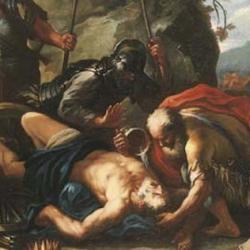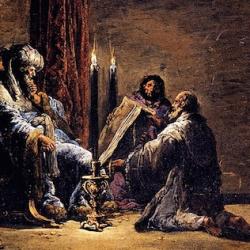Israel gathers at Hebron to make David king (1 Chronicles 11–12). There are the usual king-making actions—anointing, covenant-making, mutual declarations and pledges. It is also a festive occasion, a three-day feast of eating and drinking (12:38–40). As I’ve noted before, four beasts bring seven types of food.
It’s a military banquet: “all Israel” comes to Hebron represented by the “men of war, who could draw up in battle formation” (12:38). All Israel is a host, but we don’t see them fighting here. We see them feasting. With David as king, victory is assured, the Philistines are doomed, and Israel will again be able to eat and drink in peace, enjoying the fruits of the land. The coming of David’s kingdom takes the form of the feast of the kingdom. Saul’s kingdom is done; a new kingdom has come. Occasion for “joy indeed in Israel” (v. 40).
The Christian Eucharist is likewise a military banquet. The church militant gathers as a host in the presence of God, rejoicing in our king, glad that the ruler of this world has been thrown down, grateful that the good things of the land are again at hand.













